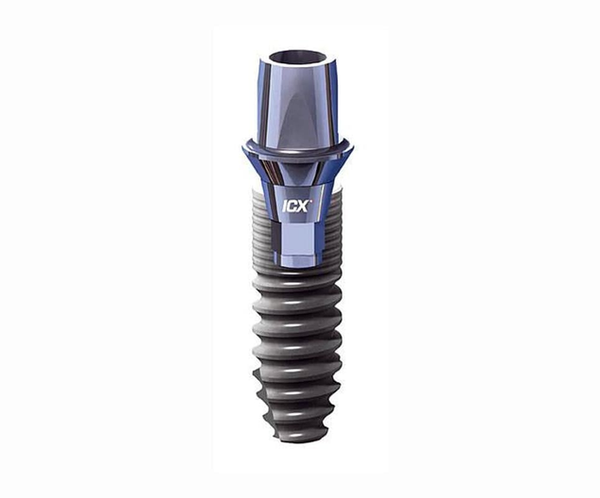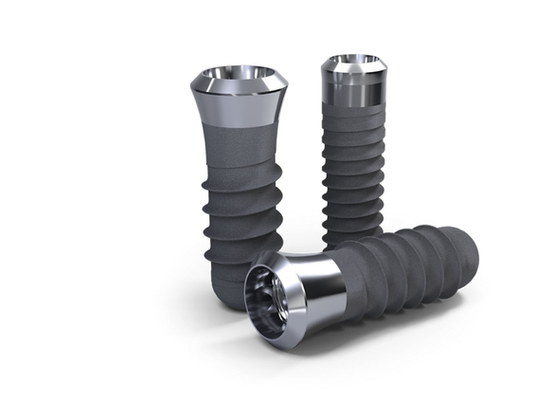
A dental implant is an artificial tooth root placed into the jawbone to replace a missing tooth. It is usually made of titanium or zirconium, materials that are biocompatible and safe for oral tissues. Since the implant is inserted directly into the jawbone, it provides a strong and long-lasting foundation.
Dental implants are the most realistic alternative — both aesthetically and functionally — for replacing a lost or extracted tooth. Once the implant is placed, a crown, bridge, or denture is attached on top, resulting in a replacement that closely resembles a natural tooth. With proper care, dental implants can last for many years, sometimes even a lifetime.

What are the parts of a dental implant?
A dental implant generally consists of three main components. These parts work together to ensure that the artificial tooth is strong and fully functional:
İmplant (Screw) – Artificial Tooth Root
Usually made of titanium, this part is surgically placed into the jawbone. It acts as a substitute for the natural tooth root and serves as a solid foundation for the other components.
It’s important to note that your dentist will evaluate whether your bone is sufficiently thick and strong before placing the dental implant. If the bone is not adequate, a suitable treatment plan will be created accordingly.
Abutment – Connecting Piece
This is a small component that is attached to the implant. It slightly protrudes above the gum line and connects the artificial tooth (crown) to the implant. The abutment is inserted directly into the implant and ensures a stable connection between the implant and the crown.
Crown – Visible Artificial Tooth
This is the part placed on top of the abutment that resembles a natural tooth. The crown is custom-made to match the patient's tooth shape and color, playing an essential role in both aesthetics and function.

When is a dental implant placed?
Placing a dental implant is an effective and long-term solution applied in cases where one or more teeth are missing. In modern dentistry, dental implants are recommended in the following situations:
-
Loss of one or more permanent teeth
The most common cause is tooth extraction or trauma. The resulting gap may affect both aesthetics and chewing function. In such cases, a dental implant replaces the natural tooth. -
Chewing difficulties and functional tooth loss
When chewing ability is impaired due to missing teeth, a dental implant helps restore normal chewing power. -
Aesthetic problems related to missing teeth
Loss of front teeth, in particular, can cause aesthetic concerns. Dental implants solve this problem by providing a natural appearance and stability. -
As an alternative to traditional bridges or dentures
If a patient is dissatisfied with removable dentures, dental implants offer a more durable and stable solution. -
When a stable orthodontic anchor is needed
In some orthodontic treatments, implants can be used as a fixed support, especially in posterior regions. Whether for functional or aesthetic reasons, dental implants are used to replace one or more missing teeth.
If the jawbone is healthy and the patient’s general health condition allows, this modern method is considered one of the most effective treatment options.

Types of dental implants
Dental implants vary based on how they are placed into the jawbone and the condition of the bone. Each type is designed for different clinical situations and has specific technical features:
-
Endosteal Implants
This is the most commonly used type of dental implant. It is inserted directly into the bone, providing strong and long-lasting results.
-
Placed inside the jawbone
-
Typically shaped like screws or cylinders
-
Suitable for patients with healthy jawbone structure
-
Subperiosteal Implants
This type of implant is placed on top of the jawbone, under the gum tissue, rather than inside the bone. It is a good option for patients with insufficient bone mass.
-
Used in patients with low jawbone volume
-
Made in the form of a metal framework
-
Applied when bone grafting is not possible
-
Zygomatic Implants
This implant type is used in cases of severe bone loss in the upper jaw. Instead of the jawbone, the implant is anchored in the cheekbone.
-
Used in advanced bone loss cases
-
Placed into the zygomatic (cheek) bone
-
Preferred when conventional implants are not viable


How is a dental implant placed? – Step-by-step treatment process
Dental implant placement is a multi-stage medical and surgical procedure. The goal is to insert an artificial tooth root into the jawbone and attach a crown or prosthesis on top. The treatment duration may vary depending on the patient's bone condition and overall health.
-
Examination and initial planning
First, the oral cavity, gums, and bone structure are examined. A panoramic X-ray or 3D tomography is used to assess bone density, thickness, and suitability for implantation. At this stage, systemic conditions such as diabetes, pregnancy, and blood disorders are also evaluated. -
Implant placement
If the bone is suitable, the implant (screw) is placed into the jawbone under local anesthesia. The procedure takes about 15–30 minutes and is painless. At RealDent Clinic, implant placement is performed under sedation, ensuring a completely pain-free experience. Note that only the artificial root is placed at this stage — the top part is not yet attached. -
Osseointegration – Bone bonding period
After placement, the bone integrates with the implant over a period of 2–4 months. This process, known as osseointegration, ensures the implant becomes firmly anchored and resistant to pressure. -
Placement of the abutment and crown
In the final stage, an abutment (connector piece) is attached to the implant, followed by a custom-made crown (artificial tooth). The shape and color of the crown are chosen to match the patient’s natural teeth.
As a result, the patient achieves an outcome that closely resembles a natural tooth, both functionally and aesthetically.

Complications and potential risks of dental implants
Dental implant placement is generally considered a safe procedure. However, in some cases, certain risks and complications may occur:
-
Inflammation and infection – Bacterial contamination at the surgical site may lead to pain, swelling, and pus formation.
-
Failed osseointegration – If the implant does not successfully fuse with the bone, it will not remain stable and may need to be removed.
-
Nerve damage – Though rare, touching the nerves in the lower jaw can cause numbness, tingling, or pain.
-
Implant displacement or fracture – If the implant is improperly placed or the patient has bruxism (teeth grinding), the implant may be damaged or dislodged.
-
Sinus issues – Implants placed in the upper jaw may be too close to the sinus cavity, potentially causing sinus-related complications.
For this reason, it is recommended to undergo the dental implant procedure only at officially certified dental clinics that strictly follow hygiene protocols. You can contact RealDent Clinic to ask any questions you may have about the implant procedure and receive detailed consultation from specialists.

Dental Implant Prices
Dental implant prices vary depending on several factors. These include the brand of the implant, the material used (titanium or zirconia), the placement area, the clinic's standards, and the dentist’s experience. In Azerbaijan, dental implant prices typically range from 800 to 2500 AZN. Titanium implants are usually the most affordable option, while zirconia implants are more aesthetic and expensive. It is recommended to have a consultation at the clinic for an accurate price. For more details, please visit the dental implant prices page.
What should we pay attention to after getting a dental implant?
Proper care and oral hygiene after a dental implant procedure are key factors that determine the implant’s longevity and functionality. The oral environment before and after implantation differs, and it is important to adapt accordingly.
In the first few days after implant placement:
-
Avoid hot, hard, and spicy foods
-
Take prescribed medications on time
-
Refrain from excessive rinsing or spitting
In the post-implant period:
-
Brush your teeth at least twice a day
-
Use dental floss or interdental brushes
-
Maintain hygiene with antiseptic mouth rinses
-
Avoid smoking and monitor blood sugar levels
-
Visit your dentist regularly, at least every six months
Remember, a dental implant, like a natural tooth, requires daily care. If oral hygiene habits were poor before the implant, they must be improved afterward to ensure long-term success. With proper maintenance, a dental implant can function healthily for many years.
What examinations are needed before a dental implant?
Before starting dental implant treatment, accurate diagnostics and imaging are crucial. Dental implants not only replace missing teeth but also provide a long-term and aesthetic solution without interfering with oral function or speech. However, to ensure a successful outcome, detailed examinations and imaging must be conducted during the planning phase.
The volume and quality of the bone in the implant site, as well as the exact location of surrounding anatomical structures (such as the inferior alveolar nerve or maxillary sinus), must be thoroughly assessed. For this purpose, various radiological methods are used — including panoramic X-rays, periapical and occlusal radiographs, lateral cephalometric imaging, and advanced technologies such as computed tomography (CT) and cone-beam computed tomography (CBCT).
These imaging tools play a critical role in implant planning. The mentioned equipment is available at RealDent Clinic and is essential for precise planning and successful functional and aesthetic outcomes of dental implants.
With these diagnostic methods, the dentist can accurately evaluate the implant’s angle, size, and bone integration. Therefore, proper diagnostics before a dental implant procedure lays the foundation for both functional success and aesthetic satisfaction.
Best Dental Implant Doctor and Clinic Selection – What Should You Pay Attention To?
When you search for keywords like “best implant doctor,” “top dental implant specialist,” or “best dental implant clinic,” you'll find many options. But we know that you’re looking for a professional and trustworthy clinic where you can confidently entrust your health. That’s why we’re here to explain why you should choose RealDent Clinic and what implantology services we offer.
RealDent Clinic operates with officially recognized certifications and provides all dental services within full legal compliance. Our team of doctors has many years of experience in implantology and holds multiple international certifications — ensuring reliable and high-quality care for our patients.
Patient satisfaction is our top priority. We are always ready to answer your questions and support you not only during the procedure but also throughout the post-implant period.
The implant materials we use — ICX (Germany) and Straumann (Switzerland) — are globally recognized for their quality and safety. Before choosing low-cost clinics that may compromise on quality, remember that in this field, low prices can sometimes come with high health risks.
Keep in mind: every implant procedure must be performed by a licensed and specialized professional. Choosing the best dental implant doctor is a key factor in achieving a successful outcome. RealDent fully meets these standards, offering you professional, safe, and results-oriented implantology services.



